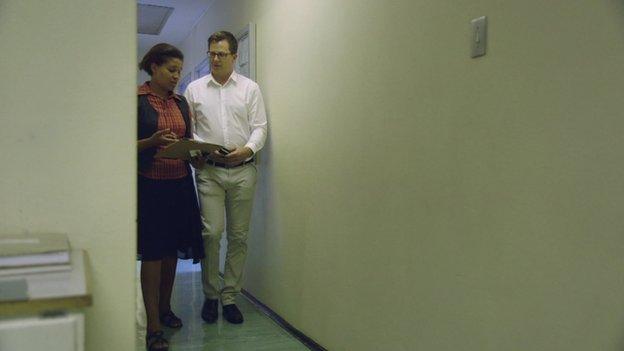'My life is so much better now'
- Published
Cataracts can cause complete blindness
In the west, cataract surgery is a routine operation. But in rural Africa, people can find it extremely difficult to get diagnosed and treated for the condition - and it can ruin their lives.
The village of Kotyana is home to 72-year-old Ndawayipheli and his wife Nojongile, 68.
It's a beautiful village over 1,300 kilometres from Cape Town, South Africa. The village is surrounded by rolling green hills.
The villagers live in brightly coloured thatched huts dotted along the lush green landscape.
However until recently neither of the couple could enjoy the breath-taking views because they both were blind.
Both Nojongile and Ndawayipheli lost their sight because of cataracts - a condition that can be corrected with a 20 minute routine surgery, but for them diagnosis and treatment is difficult to access because of the remoteness of their location.
Kotyana is up to four hours' travel away from Mthatha, where cataract surgery is offered. And the waiting list there is up to a year long.
Recently, however, a cataract surgery service has been created less than an hour from Kotyana - which is where Nojongile was treated last year and where Ndawayipheli will have his operation later this year.
Open access
It was the obstacle of remoteness that Dr William Mapham, an ophthalmology registrar at Tygerberg hospital set out to overcome.

Dr William Mapham developed the app
He came up with an app that runs on smartphones - the Vula App.
Vula means 'open' in Siswati, Xhosa and Zulu and the app enables health workers anywhere in the country to assess eye patients in remote consultation with an eye health specialist.
They can carry out a vision test, photograph the eye, and go through a checklist of symptoms. Once these details are uploaded, a specialist miles away can offer a diagnosis, recommend treatment or book an appointment at a specialist centre.
Restoring sight
As a result of her cataract surgery in both eyes, Nojongile can now see again and perform her daily chores.
Until recently, she had to ask for help from other women in the village.
She now relishes tasks such as cooking food on her open fire, and throwing stones at the birds of prey eyeing up her baby chicks.
She says: "After the operation, my eye was covered for two days. On the third day I removed the patch and I could see!
"My life is so much better now. It was really bad when I was blind, I was even afraid to do a simple thing such as walking. I was afraid of hurting myself because I couldn't see where I was going."
Nojongile is no longer afraid of hurting herself, but her 72-year-old husband Ndawayipheli remains almost completely blind.
He totters around with the help of a walking stick and increasingly keeps himself to himself. Unfamiliar voices disturb him.
Despite the success of Nojongile's operation, Ndawayipheli remains reticent to go under the knife himself. Nojongile is trying to convince her husband to have the operation.

Dr William Mapham developed the app
Dr Mapham has visited the village to examine him using the Vula App. It means the family can also see the cataracts, which are seen more easily on a photo than in real life.
It means they can help persuade Ndawayipheli to have the procedure. He is now on a waiting list and has been connected to a specialist at a referral hospital less than 8 kilometres away from his home.
For many doctors in rural areas, treating eye problems can be challenge because they tend to be general practitioners.
So having instant access eye specialists has been a welcome change to the way they work.
Dr Amy Linde, a rural healthcare worker who often uses the app says it helps them connect us with specialists who before it was quite difficult to access.
She adds: "It allows us to access an experience level and a level of knowledge that we may not have ourselves, or, or you know things that we haven't seen before."
Med in Africa is a brand new eight-part series showcasing health innovations across Africa and what these might mean for the future of healthcare on the continent and beyond.